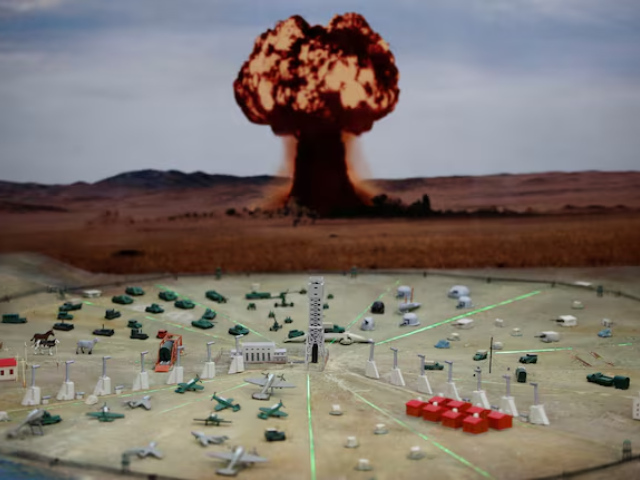The head of Russia’s nuclear testing site said on Tuesday his secretive facility was ready to resume nuclear tests “at any moment” if Moscow gave the order, in rare comments likely to fuel concerns that the risk of such a step is rising.
Moscow has not conducted a nuclear weapons test since 1990, the year before the fall of the Soviet Union, but some Western and Russian analysts say President Vladimir Putin could order one to try to send a message of deterrence to the West if it lets Ukraine use its long-range missiles to strike Russia, something that is under discussion.
A nuclear test by Russia could encourage others such as China or the United States to follow suit, starting a new nuclear arms race between the big powers, which stopped nuclear testing in the years after the Soviet collapse.
Russia’s testing site, located on the remote Novaya Zemlya archipelago in the Arctic Ocean, was where the Soviet Union conducted more than 200 nuclear tests, including the detonation of the world’s most powerful nuclear bomb ever in 1961.
It is closely watched by Western spy satellites for activity amid signs of construction work last summer shown in open-source satellite images.
Rear Admiral Andrei Sinitsyn, the head of the facility, gave a rare interview to Rossiyskaya Gazeta, the Russian government’s official newspaper, which was published on Tuesday, days after Putin warned the West it would be directly fighting with Russia if it allowed Ukraine to strike Russian territory with Western-made long-range missiles and spoke of retaliation.
“The test site is ready for resumption of full-scale testing activities. It is ready in its entirety. Laboratory and testing facilities are ready. The personnel are ready. If the order comes, we can start testing at any moment,” said Sinitsyn.
Pictured in his naval uniform alongside a cabinet holding a book about Putin and a giant white porcelain polar bear, Sinitsyn painted a picture of a facility kept in a high state of readiness that was protected by elite troops.
“The most important thing for us is not to disrupt the implementation of state tasks. If the task of resuming tests is set, it will be accomplished within the time frame stipulated,” he said.
“Demonstrative Test”
Putin, in charge of the world’s largest nuclear power, signed a law last November withdrawing Russia’s ratification of the global treaty banning nuclear weapons tests, a move he said was designed to bring Russia into line with the United States, which signed but never ratified the treaty.
Russian diplomats said at the time that Moscow would not resume nuclear testing unless Washington does. Putin said in June Russia could test a nuclear weapon “if necessary”, but saw no need to do so at the present time.
The United States last tested in 1992. Only North Korea has conducted a test involving a nuclear explosion this century.
A senior member of a Russian think-tank whose ideas sometimes become government policy suggested in May that Moscow consider a “demonstrative” nuclear explosion to cow the West.
In an article for Profil, a business magazine, Dmitry Suslov said Russia needed to act to dissuade the West from crossing a red line.
“The political and psychological effect of a nuclear mushroom cloud, which will be shown live on all TV channels around the world, will hopefully remind Western politicians of the one thing that has prevented wars between the great powers since 1945 and that they have now largely lost – fear of nuclear war,” Suslov wrote.



